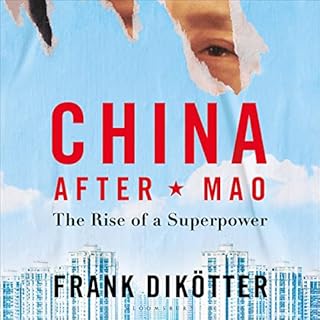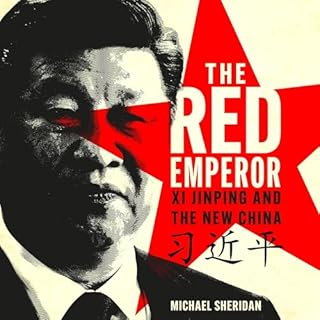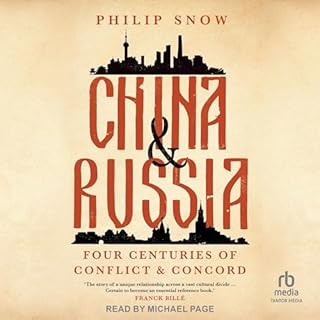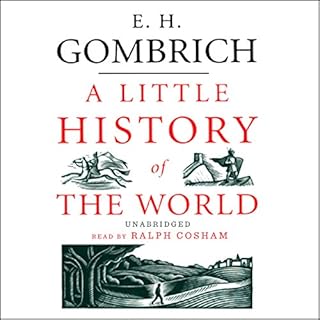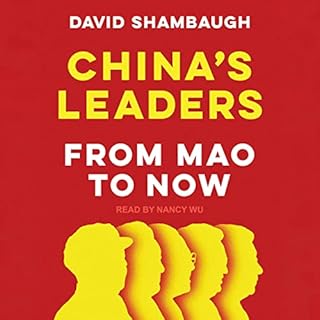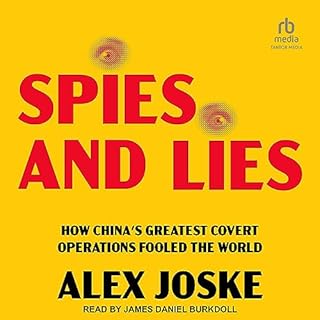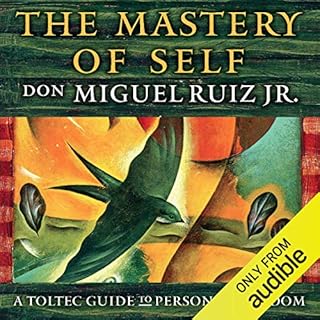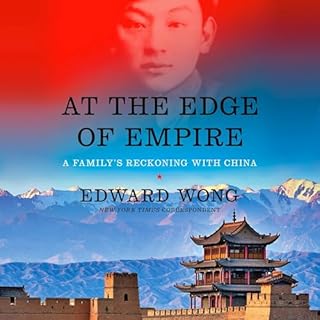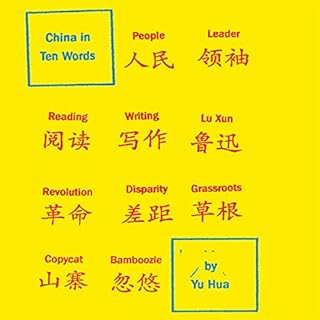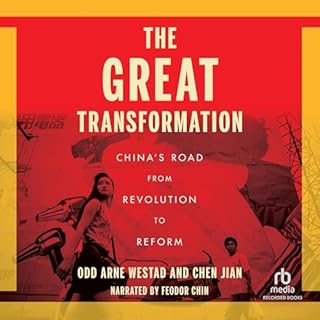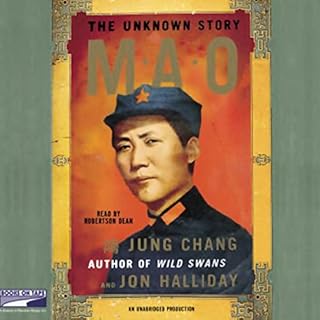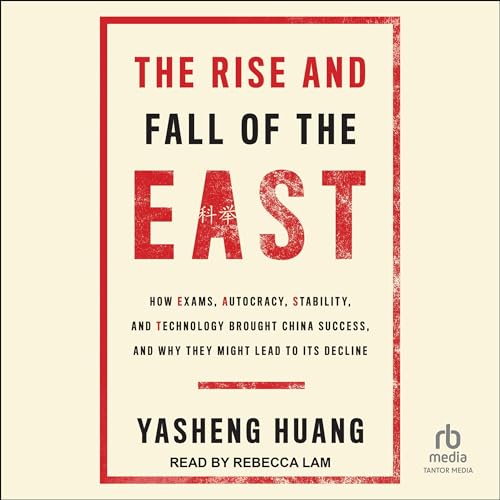
The Rise and Fall of the East
How Exams, Autocracy, Stability, and Technology Brought China Success, and Why They Might Lead to Its Decline
No se pudo agregar al carrito
Add to Cart failed.
Error al Agregar a Lista de Deseos.
Error al eliminar de la lista de deseos.
Error al añadir a tu biblioteca
Error al seguir el podcast
Error al dejar de seguir el podcast
 Exclusivo para miembros Prime: ¿Nuevo en Audible? Obtén 2 audiolibros gratis con tu prueba.
Exclusivo para miembros Prime: ¿Nuevo en Audible? Obtén 2 audiolibros gratis con tu prueba.Compra ahora por $21.49
No default payment method selected.
We are sorry. We are not allowed to sell this product with the selected payment method
-
Narrado por:
-
Rebecca Lam
Acerca de esta escucha
Chinese society has been shaped by the interplay of the EAST—exams, autocracy, stability, and technology—from ancient times through the present. Beginning with the Sui dynasty's introduction of the civil service exam, known as Keju, in 587 CE—and continuing through the personnel management system used by the Chinese Communist Party (CCP)—Chinese autocracies have developed exceptional tools for homogenizing ideas, norms, and practices. But this uniformity came with a huge downside: stifled creativity.
Yasheng Huang shows how China transitioned from dynamism to extreme stagnation after the Keju was instituted. China's most prosperous periods, such as during the Tang dynasty (618-907) and under the reformist CCP, occurred when its emphasis on scale (the size of bureaucracy) was balanced with scope (diversity of ideas).
Considering China's remarkable success over the past half-century, Huang sees signs of danger in the political and economic reversals under Xi Jinping. The CCP has again vaulted conformity above new ideas, reverting to the Keju model that eventually led to technological decline. It is a lesson from China's own history, Huang argues, that Chinese leaders would be wise to take seriously.
©2023 Yasheng Huang (P)2023 TantorLos oyentes también disfrutaron...
-
The Political Thought of Xi Jinping
- De: Steve Tsang, Olivia Cheung
- Narrado por: Rebecca Lam
- Duración: 10 h y 40 m
- Versión completa
-
General4.5 out of 5 stars 9
-
Narración:5 out of 5 stars 9
-
Historia4.5 out of 5 stars 9
Over the course of the last half dozen years, China's supreme leader Xi Jinping has made extraordinary changes which have profound implications not only for the Chinese people but nations throughout the world. Given how swiftly and fundamentally China's relations with the rest of the world are changing under Xi's rule, it is imperative that we know what Xi Jinping Thought is, how it evolved, and why it is so important.
-
5 out of 5 stars
-
An excellent work, well written and superbly read
- De MM@CC en 06-02-24
De: Steve Tsang, y otros
-
China's World View
- Demystifying China to Prevent Global Conflict
- De: David Daokui Li
- Narrado por: David Shih
- Duración: 8 h y 51 m
- Versión completa
-
General5 out of 5 stars 9
-
Narración:5 out of 5 stars 8
-
Historia5 out of 5 stars 8
Writing in response to the growing anti-Chinese sentiment and alarmed by the threat of war, Dr. David Daokui Li pulls from his wealth of firsthand experience to demystify contemporary Chinese society and advocate for understanding between China and the West. In this urgently needed and fascinating book, he explains the inner workings of a rising superpower to help the world understand how it works-and how to work with it.
-
4 out of 5 stars
-
The spirit of this book is critically important.
- De Mike Turner en 06-21-24
De: David Daokui Li
-
Overreach
- How China Derailed Its Peaceful Rise
- De: Susan L. Shirk
- Narrado por: Teri Schnaubelt
- Duración: 15 h y 6 m
- Versión completa
-
General4.5 out of 5 stars 22
-
Narración:4.5 out of 5 stars 19
-
Historia4.5 out of 5 stars 19
For three decades after Mao's death in 1976, China's leaders adopted a restrained approach to foreign policy. To facilitate the country's inexorable economic ascendance, and to prevent a backlash, they reassured the outside world of China's peaceful intentions. Then, as Susan Shirk shows, something changed. China went from fragile superpower to global heavyweight. Combining her decades of research and experience, Shirk, one of the world's most respected experts on Chinese politics, argues that we are now fully embroiled in a new cold war.
-
4 out of 5 stars
-
Performance is poor
- De Paul Reviewer en 01-28-24
De: Susan L. Shirk
-
China After Mao
- The Rise of a Superpower
- De: Frank Dikötter
- Narrado por: Daniel York Loh
- Duración: 14 h y 18 m
- Versión completa
-
General4.5 out of 5 stars 11
-
Narración:5 out of 5 stars 10
-
Historia4.5 out of 5 stars 10
Award-winning historian Frank Dikötter explores how the People’s Republic of China was transformed from a backwater economy in the 1970s into the world superpower of today. His account is the first to be based on hundreds of previously unseen archival documents, from the secret minutes of top party meetings to confidential bank reports. Unfolding with great narrative sweep, this riveting, richly detailed chronicle recasts our understanding of an era that both the regime and foreign admirers celebrate as an economic miracle.
-
1 out of 5 stars
-
This guy's writing style is trash
- De L YS en 10-06-24
De: Frank Dikötter
-
The Red Emperor
- Xi Jinping and His New China
- De: Michael Sheridan
- Narrado por: Daniel York Loh
- Duración: 10 h y 19 m
- Versión completa
-
General5 out of 5 stars 7
-
Narración:5 out of 5 stars 7
-
Historia5 out of 5 stars 7
Xi Jinping rules over 1.4 billion people and the second biggest economy on earth. He commands huge armed forces and runs a technology programme meant to dominate the globe. His ambition is to take the place of the United States and to change the world order. Xi's life story is full of drama: plots, purges, murders, a power struggle and a pandemic. The book, based on new sources, leads the listener from the poor, isolated China of the 1950s to the modern economic and military juggernaut of today.
-
5 out of 5 stars
-
Nothing changes in red communist fascist China
- De Johanna Spilman en 09-13-24
De: Michael Sheridan
-
Sparks
- China’s Underground Historians and Their Battle for the Future
- De: Ian Johnson
- Narrado por: Ian Johnson
- Duración: 12 h y 11 m
- Versión completa
-
General4.5 out of 5 stars 15
-
Narración:4.5 out of 5 stars 13
-
Historia4.5 out of 5 stars 13
The past is a battleground in many countries, but in China it is crucial to political power. In traditional China, dynasties rewrote history to justify their rule by proving that their predecessors were unworthy of holding power. Marxism gave this a modern gloss, describing history as an unstoppable force heading toward Communism's triumph. The Chinese Communist Party builds on these ideas to whitewash its misdeeds and glorify its rule. But in recent years, independent writers, artists, and filmmakers have begun challenging this state-led disremembering.
-
5 out of 5 stars
-
brilliant
- De Yangsian en 06-02-24
De: Ian Johnson
-
The Political Thought of Xi Jinping
- De: Steve Tsang, Olivia Cheung
- Narrado por: Rebecca Lam
- Duración: 10 h y 40 m
- Versión completa
-
General4.5 out of 5 stars 9
-
Narración:5 out of 5 stars 9
-
Historia4.5 out of 5 stars 9
Over the course of the last half dozen years, China's supreme leader Xi Jinping has made extraordinary changes which have profound implications not only for the Chinese people but nations throughout the world. Given how swiftly and fundamentally China's relations with the rest of the world are changing under Xi's rule, it is imperative that we know what Xi Jinping Thought is, how it evolved, and why it is so important.
-
5 out of 5 stars
-
An excellent work, well written and superbly read
- De MM@CC en 06-02-24
De: Steve Tsang, y otros
-
China's World View
- Demystifying China to Prevent Global Conflict
- De: David Daokui Li
- Narrado por: David Shih
- Duración: 8 h y 51 m
- Versión completa
-
General5 out of 5 stars 9
-
Narración:5 out of 5 stars 8
-
Historia5 out of 5 stars 8
Writing in response to the growing anti-Chinese sentiment and alarmed by the threat of war, Dr. David Daokui Li pulls from his wealth of firsthand experience to demystify contemporary Chinese society and advocate for understanding between China and the West. In this urgently needed and fascinating book, he explains the inner workings of a rising superpower to help the world understand how it works-and how to work with it.
-
4 out of 5 stars
-
The spirit of this book is critically important.
- De Mike Turner en 06-21-24
De: David Daokui Li
-
Overreach
- How China Derailed Its Peaceful Rise
- De: Susan L. Shirk
- Narrado por: Teri Schnaubelt
- Duración: 15 h y 6 m
- Versión completa
-
General4.5 out of 5 stars 22
-
Narración:4.5 out of 5 stars 19
-
Historia4.5 out of 5 stars 19
For three decades after Mao's death in 1976, China's leaders adopted a restrained approach to foreign policy. To facilitate the country's inexorable economic ascendance, and to prevent a backlash, they reassured the outside world of China's peaceful intentions. Then, as Susan Shirk shows, something changed. China went from fragile superpower to global heavyweight. Combining her decades of research and experience, Shirk, one of the world's most respected experts on Chinese politics, argues that we are now fully embroiled in a new cold war.
-
4 out of 5 stars
-
Performance is poor
- De Paul Reviewer en 01-28-24
De: Susan L. Shirk
-
China After Mao
- The Rise of a Superpower
- De: Frank Dikötter
- Narrado por: Daniel York Loh
- Duración: 14 h y 18 m
- Versión completa
-
General4.5 out of 5 stars 11
-
Narración:5 out of 5 stars 10
-
Historia4.5 out of 5 stars 10
Award-winning historian Frank Dikötter explores how the People’s Republic of China was transformed from a backwater economy in the 1970s into the world superpower of today. His account is the first to be based on hundreds of previously unseen archival documents, from the secret minutes of top party meetings to confidential bank reports. Unfolding with great narrative sweep, this riveting, richly detailed chronicle recasts our understanding of an era that both the regime and foreign admirers celebrate as an economic miracle.
-
1 out of 5 stars
-
This guy's writing style is trash
- De L YS en 10-06-24
De: Frank Dikötter
-
The Red Emperor
- Xi Jinping and His New China
- De: Michael Sheridan
- Narrado por: Daniel York Loh
- Duración: 10 h y 19 m
- Versión completa
-
General5 out of 5 stars 7
-
Narración:5 out of 5 stars 7
-
Historia5 out of 5 stars 7
Xi Jinping rules over 1.4 billion people and the second biggest economy on earth. He commands huge armed forces and runs a technology programme meant to dominate the globe. His ambition is to take the place of the United States and to change the world order. Xi's life story is full of drama: plots, purges, murders, a power struggle and a pandemic. The book, based on new sources, leads the listener from the poor, isolated China of the 1950s to the modern economic and military juggernaut of today.
-
5 out of 5 stars
-
Nothing changes in red communist fascist China
- De Johanna Spilman en 09-13-24
De: Michael Sheridan
-
Sparks
- China’s Underground Historians and Their Battle for the Future
- De: Ian Johnson
- Narrado por: Ian Johnson
- Duración: 12 h y 11 m
- Versión completa
-
General4.5 out of 5 stars 15
-
Narración:4.5 out of 5 stars 13
-
Historia4.5 out of 5 stars 13
The past is a battleground in many countries, but in China it is crucial to political power. In traditional China, dynasties rewrote history to justify their rule by proving that their predecessors were unworthy of holding power. Marxism gave this a modern gloss, describing history as an unstoppable force heading toward Communism's triumph. The Chinese Communist Party builds on these ideas to whitewash its misdeeds and glorify its rule. But in recent years, independent writers, artists, and filmmakers have begun challenging this state-led disremembering.
-
5 out of 5 stars
-
brilliant
- De Yangsian en 06-02-24
De: Ian Johnson
-
Victorious in Defeat
- The Life and Times of Chiang Kai-shek, China, 1887-1975
- De: Alexander V. Pantsov, Steven I. Levine - translator
- Narrado por: Rick Adamson
- Duración: 25 h y 42 m
- Versión completa
-
General4.5 out of 5 stars 14
-
Narración:4.5 out of 5 stars 14
-
Historia4.5 out of 5 stars 14
Chiang Kai-shek (1887-1975) led the Republic of China for almost fifty years, starting in 1926. He was the architect of a new republican China, a hero of the Second World War, and a faithful ally of the United States. Simultaneously a Christian and a Confucian, Chiang dreamed of universal equality yet was a perfidious and cunning dictator responsible for the deaths of over 1.5 million innocent people. This critical biography is based on Chiang Kai-shek's unpublished diaries, his extensive personal files from the Russian archives, and the Russian files of his relatives, associates, and foes.
-
4 out of 5 stars
-
A hard story to tell
- De A reader en 08-31-24
De: Alexander V. Pantsov, y otros
-
Party of One
- The Rise of Xi Jinping and China's Superpower Future
- De: Chun Han Wong
- Narrado por: Feodor Chin
- Duración: 14 h y 20 m
- Versión completa
-
General4.5 out of 5 stars 59
-
Narración:4.5 out of 5 stars 53
-
Historia4.5 out of 5 stars 53
From one of the most admired reporters covering China today comes a vital new account of the life and political vision of Xi Jinping, the authoritarian leader of the People’s Republic whose hard-edged tactics have set the rising superpower on a collision with Western liberal democracies. Party of One shatters the many myths that shroud one of the world’s most secretive political organizations and its leader. Many observers misread Xi during his early years in power, projecting their own hopes that he would steer China toward more political openness, rule of law, and pro-market economics.
-
5 out of 5 stars
-
Worrisome
- De Kelley A. Arasim en 10-30-23
De: Chun Han Wong
-
The New China Playbook
- Beyond Socialism and Capitalism
- De: Keyu Jin
- Narrado por: Jenapher Zheng
- Duración: 11 h y 5 m
- Versión completa
-
General4 out of 5 stars 72
-
Narración:4.5 out of 5 stars 63
-
Historia4 out of 5 stars 63
China's economy has been booming for decades now. A formidable and emerging power on the world stage, the China that most Americans picture is only a rough sketch, based on American news coverage, policy, and ways of understanding. Enter Keyu Jin: a world-renowned economist and a professor at the London School of Economics. A person fluent in both Eastern and Western cultures, and a voice of the new generation of Chinese who represent a radical break from the past, Jin is uniquely poised to explain how China became the most successful economic story of our time.
-
3 out of 5 stars
-
Good content but missing important information
- De Anonymous User en 07-03-23
De: Keyu Jin
-
The Economic Weapon
- The Rise of Sanctions as a Tool of Modern War
- De: Nicholas Mulder
- Narrado por: Liam Gerrard
- Duración: 12 h y 25 m
- Versión completa
-
General4.5 out of 5 stars 109
-
Narración:4.5 out of 5 stars 82
-
Historia4.5 out of 5 stars 83
Economic sanctions dominate the landscape of world politics today. First developed in the early twentieth century as a way of exploiting the flows of globalization to defend liberal internationalism, their appeal is that they function as an alternative to war. This view, however, ignores the dark paradox at their core: designed to prevent war, economic sanctions are modeled on devastating techniques of warfare.
-
5 out of 5 stars
-
History of sanctions during the early 20th century
- De Mehdi Mollahasani en 03-05-22
De: Nicholas Mulder
-
China and Russia
- Four Centuries of Conflict and Concord
- De: Philip Snow
- Narrado por: Michael Page
- Duración: 25 h y 51 m
- Versión completa
-
General4.5 out of 5 stars 2
-
Narración:4.5 out of 5 stars 2
-
Historia4.5 out of 5 stars 2
Russia and China, the largest and most populous countries in the world, respectively, have maintained a delicate relationship for four centuries. In addition to a four-thousand-kilometer border, they have periodically shared a common outlook on political and economic affairs. But they are, in essence, profoundly different polities and cultures, and their intermittent alliances have proven difficult and at times even volatile. Philip Snow provides a full account of the relationship between these two global giants.
De: Philip Snow
-
A Little History of the World
- De: E. H. Gombrich
- Narrado por: Ralph Cosham
- Duración: 9 h y 11 m
- Versión completa
-
General4.5 out of 5 stars 4,081
-
Narración:4.5 out of 5 stars 3,428
-
Historia4.5 out of 5 stars 3,414
E. H. Gombrich's world history, an international best seller now available in English for the first time, is a text dominated not by dates and facts but by the sweep of experience across the centuries, a guide to humanity's achievements, and an acute witness to its frailties.
-
5 out of 5 stars
-
an enlightening book; very well read
- De A.B.Oxford en 06-03-06
De: E. H. Gombrich
-
Germany, 1923
- Hyperinflation, Hitler's Pusch and Democracy in Crisis
- De: Volker Ullrich, Jefferson Chase - translator
- Narrado por: Christopher Douyard
- Duración: 12 h y 56 m
- Versión completa
-
General4.5 out of 5 stars 12
-
Narración:4.5 out of 5 stars 12
-
Historia4.5 out of 5 stars 12
The great Austrian writer Stefan Zweig confided in his autobiography: “I have a pretty thorough knowledge of history, but never, to my recollection, has it produced such madness in such gigantic proportions.” He was referring to Germany in 1923, a “year of lunacy,” defined by hyperinflation, violence, a political system on the verge of collapse, the rise of Adolf Hitler and the Nazi Party, and separatist movements threatening to rip apart the German nation. Bestselling author Volker Ullrich presents a riveting chronicle of one of the most difficult years any modern democracy has ever faced.
-
5 out of 5 stars
-
Interesting read about economics
- De molliet en 11-01-23
De: Volker Ullrich, y otros
-
China's Leaders
- From Mao to Now
- De: David Shambaugh
- Narrado por: Nancy Wu
- Duración: 13 h y 59 m
- Versión completa
-
General4.5 out of 5 stars 42
-
Narración:5 out of 5 stars 35
-
Historia4.5 out of 5 stars 34
Since the founding of the People's Republic of China over seventy years ago, five paramount leaders have shaped the fates and fortunes of the nation and the ruling Chinese Communist Party: Mao Zedong, Deng Xiaoping, Jiang Zemin, Hu Jintao, and Xi Jinping. Under their leaderships, China has undergone an extraordinary transformation from an undeveloped and insular country to a comprehensive world power. In this definitive study, renowned Sinologist David Shambaugh offers a refreshing account of China's dramatic post-revolutionary history through the prism of those who ruled it.
-
5 out of 5 stars
-
Very informative
- De JohnDoe en 04-03-23
De: David Shambaugh
-
Beijing Rules
- How China Weaponized Its Economy to Confront the World
- De: Bethany Allen
- Narrado por: Emily Woo Zeller
- Duración: 12 h y 14 m
- Versión completa
-
General4.5 out of 5 stars 16
-
Narración:5 out of 5 stars 12
-
Historia4.5 out of 5 stars 12
An acclaimed journalist on contemporary China lays bare the country's two-decade quest for global dominance and how the Chinese Communist Party coopted what Western leaders have long considered their most powerful tool in the fight for liberal democracy—capitalism—to expand its influence worldwide.
-
2 out of 5 stars
-
The new cold war and racist double standards
- De Burkay en 04-10-24
De: Bethany Allen
-
How to Be a Dictator
- The Cult of Personality in the Twentieth Century
- De: Frank Dikötter
- Narrado por: Jack Bennett
- Duración: 9 h y 4 m
- Versión completa
-
General4.5 out of 5 stars 167
-
Narración:4.5 out of 5 stars 141
-
Historia4.5 out of 5 stars 140
No dictator can rule through fear and violence alone. Naked power can be grabbed and held temporarily, but it never suffices in the long term. A tyrant who can compel his own people to acclaim him will last longer. The paradox of the modern dictator is that he must create the illusion of popular support. Throughout the 20th century, hundreds of millions of people were condemned to enthusiasm, obliged to hail their leaders even as they were herded down the road to serfdom.
-
5 out of 5 stars
-
Worth a listen
- De Amazon Customer en 12-06-19
De: Frank Dikötter
-
Remembering Shanghai
- A Memoir of Socialites, Scholars and Scoundrels
- De: Isabel Sun Chao, Claire Chao
- Narrado por: Rachel Yong, Claire Chao, Isabel Sun Chao
- Duración: 7 h y 59 m
- Versión completa
-
General4.5 out of 5 stars 85
-
Narración:4.5 out of 5 stars 68
-
Historia4.5 out of 5 stars 69
Meticulously researched, Remembering Shanghai follows five generations, from vibrant Shanghai to the bright lights of Hong Kong. By turns harrowing and heartwarming, this vivid memoir explores identity and loss against the epic backdrop of a country in turmoil.
-
5 out of 5 stars
-
touching stories of resilience and family
- De Rodger en 01-17-21
De: Isabel Sun Chao, y otros
-
Spies and Lies
- How China's Greatest Covert Operations Fooled the World
- De: Alex Joske
- Narrado por: James Daniel Burkdoll
- Duración: 8 h y 6 m
- Versión completa
-
General5 out of 5 stars 12
-
Narración:5 out of 5 stars 11
-
Historia4.5 out of 5 stars 11
Spies and Lies a groundbreaking expose of elite influence operations by China's little-known Ministry of State Security. Revealing for the first time how the Chinese Communist Party has tasked its spies to deceive the world, it challenges the conventional account of China's past, present, and future.
-
5 out of 5 stars
-
Beware of the MSS
- De Reed Ramlow en 03-08-24
De: Alex Joske
Relacionado con este tema
-
The Art of War
- De: Sun Tzu
- Narrado por: Aidan Gillen
- Duración: 1 h y 7 m
- Versión completa
-
General4.5 out of 5 stars 41,738
-
Narración:4.5 out of 5 stars 34,578
-
Historia4.5 out of 5 stars 34,159
The 13 chapters of The Art of War, each devoted to one aspect of warfare, were compiled by the high-ranking Chinese military general, strategist, and philosopher Sun-Tzu. In spite of its battlefield specificity, The Art of War has found new life in the modern age, with leaders in fields as wide and far-reaching as world politics, human psychology, and corporate strategy finding valuable insight in its timeworn words.
-
5 out of 5 stars
-
The actual book The Art of War, not a commentary
- De Nemo71 en 12-31-19
De: Sun Tzu
-
My Big TOE: Awakening
- Book One of a Trilogy Unifying Philosophy, Physics, and Metaphysics
- De: Thomas Campbell
- Narrado por: Thomas Campbell
- Duración: 11 h y 11 m
- Versión completa
-
General4.5 out of 5 stars 503
-
Narración:4.5 out of 5 stars 435
-
Historia4.5 out of 5 stars 430
My Big TOE: Awakening, written by a nuclear physicist in the language of contemporary culture, unifies science and philosophy, physics and metaphysics, mind and matter, purpose and meaning, the normal and the paranormal. The entirety of human experience (mind, body, and spirit) including both our objective and subjective worlds is brought together under one seamless scientific understanding.
-
2 out of 5 stars
-
What a Trip (but to where?)
- De Michael en 11-26-13
De: Thomas Campbell
-
The Daily Stoic
- 366 Meditations on Wisdom, Perseverance, and the Art of Living
- De: Ryan Holiday, Stephen Hanselman
- Narrado por: Brian Holsopple
- Duración: 10 h y 6 m
- Versión completa
-
General5 out of 5 stars 3,262
-
Narración:4.5 out of 5 stars 2,738
-
Historia5 out of 5 stars 2,703
Why have history's greatest minds - from George Washington to Frederick the Great to Ralph Waldo Emerson along with today's top performers, from Super Bowl-winning football coaches to CEOs and celebrities - embraced the wisdom of the ancient Stoics? Because they realize that the most valuable wisdom is timeless and that philosophy is for living a better life, not a classroom exercise. The Daily Stoic offers a daily devotional of Stoic insights and exercises, featuring all-new translations.
-
2 out of 5 stars
-
Not well made as audio
- De Andreas en 12-27-16
De: Ryan Holiday, y otros
-
The Mastery of Self
- A Toltec Guide to Personal Freedom
- De: Don Miguel Ruiz Jr.
- Narrado por: Charlie Varon
- Duración: 3 h y 30 m
- Versión completa
-
General5 out of 5 stars 4,474
-
Narración:5 out of 5 stars 3,716
-
Historia5 out of 5 stars 3,696
The ancient Toltecs believed that life, as we perceive it, is a dream. We each live in our own personal dream, and these come together to form the dream of the planet, or the world in which we live. Problems arise when our perception of the dream becomes clouded with negativity, drama, and judgment (of ourselves and others), because it's in these moments of suffering that we have forgotten that we are the architects of our own reality and we have the power to change our dream if we choose.
-
5 out of 5 stars
-
listen.. .then listen again
- De Casiano en 12-22-16
-
The Thin Line
- Hope vs. Reality in the Era of Weight-Loss Drugs
- De: Scaachi Koul
- Narrado por: Scaachi Koul
- Duración: 4 h y 31 m
- Grabación Original
-
General4.5 out of 5 stars 105
-
Narración:5 out of 5 stars 102
-
Historia4.5 out of 5 stars 102
Over the next five years, millions of more Americans are expected to take Ozempic and other GLP-1 weight-loss drugs, which are rapidly being recognized as the miracle drugs of this century. If you’re not on them, you’ll probably know someone who is. What are the implications of the widespread use of these drugs, both on our bodies and our society? In this show, you’ll meet people across America who are either taking the jab or thinking about it, and the shocking intentional and unintentional results they are seeing.
-
5 out of 5 stars
-
More balanced than expected and very comprehensive
- De Summer Rodriguez en 01-03-25
De: Scaachi Koul
-
The Autobiography of Malcolm X
- As Told to Alex Haley
- De: Malcolm X, Alex Haley
- Narrado por: Laurence Fishburne
- Duración: 16 h y 52 m
- Versión completa
-
General5 out of 5 stars 12,543
-
Narración:5 out of 5 stars 11,159
-
Historia5 out of 5 stars 11,100
Experience a bold take on this classic autobiography as it’s performed by Oscar-nominated Laurence Fishburne. In this searing classic autobiography, originally published in 1965, Malcolm X, the Muslim leader, firebrand, and Black empowerment activist, tells the extraordinary story of his life and the growth of the Human Rights movement. His fascinating perspective on the lies and limitations of the American dream and the inherent racism in a society that denies its non-White citizens the opportunity to dream, gives extraordinary insight into the most urgent issues of our own time.
-
4 out of 5 stars
-
it's Nearly perfect
- De Kerry en 09-16-20
De: Malcolm X, y otros
-
The Art of War
- De: Sun Tzu
- Narrado por: Aidan Gillen
- Duración: 1 h y 7 m
- Versión completa
-
General4.5 out of 5 stars 41,738
-
Narración:4.5 out of 5 stars 34,578
-
Historia4.5 out of 5 stars 34,159
The 13 chapters of The Art of War, each devoted to one aspect of warfare, were compiled by the high-ranking Chinese military general, strategist, and philosopher Sun-Tzu. In spite of its battlefield specificity, The Art of War has found new life in the modern age, with leaders in fields as wide and far-reaching as world politics, human psychology, and corporate strategy finding valuable insight in its timeworn words.
-
5 out of 5 stars
-
The actual book The Art of War, not a commentary
- De Nemo71 en 12-31-19
De: Sun Tzu
-
My Big TOE: Awakening
- Book One of a Trilogy Unifying Philosophy, Physics, and Metaphysics
- De: Thomas Campbell
- Narrado por: Thomas Campbell
- Duración: 11 h y 11 m
- Versión completa
-
General4.5 out of 5 stars 503
-
Narración:4.5 out of 5 stars 435
-
Historia4.5 out of 5 stars 430
My Big TOE: Awakening, written by a nuclear physicist in the language of contemporary culture, unifies science and philosophy, physics and metaphysics, mind and matter, purpose and meaning, the normal and the paranormal. The entirety of human experience (mind, body, and spirit) including both our objective and subjective worlds is brought together under one seamless scientific understanding.
-
2 out of 5 stars
-
What a Trip (but to where?)
- De Michael en 11-26-13
De: Thomas Campbell
-
The Daily Stoic
- 366 Meditations on Wisdom, Perseverance, and the Art of Living
- De: Ryan Holiday, Stephen Hanselman
- Narrado por: Brian Holsopple
- Duración: 10 h y 6 m
- Versión completa
-
General5 out of 5 stars 3,262
-
Narración:4.5 out of 5 stars 2,738
-
Historia5 out of 5 stars 2,703
Why have history's greatest minds - from George Washington to Frederick the Great to Ralph Waldo Emerson along with today's top performers, from Super Bowl-winning football coaches to CEOs and celebrities - embraced the wisdom of the ancient Stoics? Because they realize that the most valuable wisdom is timeless and that philosophy is for living a better life, not a classroom exercise. The Daily Stoic offers a daily devotional of Stoic insights and exercises, featuring all-new translations.
-
2 out of 5 stars
-
Not well made as audio
- De Andreas en 12-27-16
De: Ryan Holiday, y otros
-
The Mastery of Self
- A Toltec Guide to Personal Freedom
- De: Don Miguel Ruiz Jr.
- Narrado por: Charlie Varon
- Duración: 3 h y 30 m
- Versión completa
-
General5 out of 5 stars 4,474
-
Narración:5 out of 5 stars 3,716
-
Historia5 out of 5 stars 3,696
The ancient Toltecs believed that life, as we perceive it, is a dream. We each live in our own personal dream, and these come together to form the dream of the planet, or the world in which we live. Problems arise when our perception of the dream becomes clouded with negativity, drama, and judgment (of ourselves and others), because it's in these moments of suffering that we have forgotten that we are the architects of our own reality and we have the power to change our dream if we choose.
-
5 out of 5 stars
-
listen.. .then listen again
- De Casiano en 12-22-16
-
The Thin Line
- Hope vs. Reality in the Era of Weight-Loss Drugs
- De: Scaachi Koul
- Narrado por: Scaachi Koul
- Duración: 4 h y 31 m
- Grabación Original
-
General4.5 out of 5 stars 105
-
Narración:5 out of 5 stars 102
-
Historia4.5 out of 5 stars 102
Over the next five years, millions of more Americans are expected to take Ozempic and other GLP-1 weight-loss drugs, which are rapidly being recognized as the miracle drugs of this century. If you’re not on them, you’ll probably know someone who is. What are the implications of the widespread use of these drugs, both on our bodies and our society? In this show, you’ll meet people across America who are either taking the jab or thinking about it, and the shocking intentional and unintentional results they are seeing.
-
5 out of 5 stars
-
More balanced than expected and very comprehensive
- De Summer Rodriguez en 01-03-25
De: Scaachi Koul
-
The Autobiography of Malcolm X
- As Told to Alex Haley
- De: Malcolm X, Alex Haley
- Narrado por: Laurence Fishburne
- Duración: 16 h y 52 m
- Versión completa
-
General5 out of 5 stars 12,543
-
Narración:5 out of 5 stars 11,159
-
Historia5 out of 5 stars 11,100
Experience a bold take on this classic autobiography as it’s performed by Oscar-nominated Laurence Fishburne. In this searing classic autobiography, originally published in 1965, Malcolm X, the Muslim leader, firebrand, and Black empowerment activist, tells the extraordinary story of his life and the growth of the Human Rights movement. His fascinating perspective on the lies and limitations of the American dream and the inherent racism in a society that denies its non-White citizens the opportunity to dream, gives extraordinary insight into the most urgent issues of our own time.
-
4 out of 5 stars
-
it's Nearly perfect
- De Kerry en 09-16-20
De: Malcolm X, y otros
Las personas que vieron esto también vieron...
-
China's World View
- Demystifying China to Prevent Global Conflict
- De: David Daokui Li
- Narrado por: David Shih
- Duración: 8 h y 51 m
- Versión completa
-
General5 out of 5 stars 9
-
Narración:5 out of 5 stars 8
-
Historia5 out of 5 stars 8
Writing in response to the growing anti-Chinese sentiment and alarmed by the threat of war, Dr. David Daokui Li pulls from his wealth of firsthand experience to demystify contemporary Chinese society and advocate for understanding between China and the West. In this urgently needed and fascinating book, he explains the inner workings of a rising superpower to help the world understand how it works-and how to work with it.
-
4 out of 5 stars
-
The spirit of this book is critically important.
- De Mike Turner en 06-21-24
De: David Daokui Li
-
The Political Thought of Xi Jinping
- De: Steve Tsang, Olivia Cheung
- Narrado por: Rebecca Lam
- Duración: 10 h y 40 m
- Versión completa
-
General4.5 out of 5 stars 9
-
Narración:5 out of 5 stars 9
-
Historia4.5 out of 5 stars 9
Over the course of the last half dozen years, China's supreme leader Xi Jinping has made extraordinary changes which have profound implications not only for the Chinese people but nations throughout the world. Given how swiftly and fundamentally China's relations with the rest of the world are changing under Xi's rule, it is imperative that we know what Xi Jinping Thought is, how it evolved, and why it is so important.
-
5 out of 5 stars
-
An excellent work, well written and superbly read
- De MM@CC en 06-02-24
De: Steve Tsang, y otros
-
The New China Playbook
- Beyond Socialism and Capitalism
- De: Keyu Jin
- Narrado por: Jenapher Zheng
- Duración: 11 h y 5 m
- Versión completa
-
General4 out of 5 stars 72
-
Narración:4.5 out of 5 stars 63
-
Historia4 out of 5 stars 63
China's economy has been booming for decades now. A formidable and emerging power on the world stage, the China that most Americans picture is only a rough sketch, based on American news coverage, policy, and ways of understanding. Enter Keyu Jin: a world-renowned economist and a professor at the London School of Economics. A person fluent in both Eastern and Western cultures, and a voice of the new generation of Chinese who represent a radical break from the past, Jin is uniquely poised to explain how China became the most successful economic story of our time.
-
3 out of 5 stars
-
Good content but missing important information
- De Anonymous User en 07-03-23
De: Keyu Jin
-
Party of One
- The Rise of Xi Jinping and China's Superpower Future
- De: Chun Han Wong
- Narrado por: Feodor Chin
- Duración: 14 h y 20 m
- Versión completa
-
General4.5 out of 5 stars 59
-
Narración:4.5 out of 5 stars 53
-
Historia4.5 out of 5 stars 53
From one of the most admired reporters covering China today comes a vital new account of the life and political vision of Xi Jinping, the authoritarian leader of the People’s Republic whose hard-edged tactics have set the rising superpower on a collision with Western liberal democracies. Party of One shatters the many myths that shroud one of the world’s most secretive political organizations and its leader. Many observers misread Xi during his early years in power, projecting their own hopes that he would steer China toward more political openness, rule of law, and pro-market economics.
-
5 out of 5 stars
-
Worrisome
- De Kelley A. Arasim en 10-30-23
De: Chun Han Wong
-
At the Edge of Empire
- A Family's Reckoning with China
- De: Edward Wong
- Narrado por: Edward Wong, Will Dao
- Duración: 16 h y 49 m
- Versión completa
-
General4.5 out of 5 stars 20
-
Narración:4.5 out of 5 stars 18
-
Historia4.5 out of 5 stars 18
The son of Chinese immigrants in Washington, DC, Edward Wong grew up among family secrets. His father toiled in Chinese restaurants and rarely spoke of his native land or his years in the People’s Liberation Army under Mao. Yook Kearn Wong came of age during the Japanese occupation in World War II and the Communist revolution, when he fell under the spell of Mao’s promise of a powerful China. His astonishing journey as a soldier took him from Manchuria during the Korean War to Xinjiang on the Central Asian frontier.
-
4 out of 5 stars
-
Well written, investigative
- De barbara en 11-24-24
De: Edward Wong
-
Beijing Rules
- How China Weaponized Its Economy to Confront the World
- De: Bethany Allen
- Narrado por: Emily Woo Zeller
- Duración: 12 h y 14 m
- Versión completa
-
General4.5 out of 5 stars 16
-
Narración:5 out of 5 stars 12
-
Historia4.5 out of 5 stars 12
An acclaimed journalist on contemporary China lays bare the country's two-decade quest for global dominance and how the Chinese Communist Party coopted what Western leaders have long considered their most powerful tool in the fight for liberal democracy—capitalism—to expand its influence worldwide.
-
2 out of 5 stars
-
The new cold war and racist double standards
- De Burkay en 04-10-24
De: Bethany Allen
-
China's World View
- Demystifying China to Prevent Global Conflict
- De: David Daokui Li
- Narrado por: David Shih
- Duración: 8 h y 51 m
- Versión completa
-
General5 out of 5 stars 9
-
Narración:5 out of 5 stars 8
-
Historia5 out of 5 stars 8
Writing in response to the growing anti-Chinese sentiment and alarmed by the threat of war, Dr. David Daokui Li pulls from his wealth of firsthand experience to demystify contemporary Chinese society and advocate for understanding between China and the West. In this urgently needed and fascinating book, he explains the inner workings of a rising superpower to help the world understand how it works-and how to work with it.
-
4 out of 5 stars
-
The spirit of this book is critically important.
- De Mike Turner en 06-21-24
De: David Daokui Li
-
The Political Thought of Xi Jinping
- De: Steve Tsang, Olivia Cheung
- Narrado por: Rebecca Lam
- Duración: 10 h y 40 m
- Versión completa
-
General4.5 out of 5 stars 9
-
Narración:5 out of 5 stars 9
-
Historia4.5 out of 5 stars 9
Over the course of the last half dozen years, China's supreme leader Xi Jinping has made extraordinary changes which have profound implications not only for the Chinese people but nations throughout the world. Given how swiftly and fundamentally China's relations with the rest of the world are changing under Xi's rule, it is imperative that we know what Xi Jinping Thought is, how it evolved, and why it is so important.
-
5 out of 5 stars
-
An excellent work, well written and superbly read
- De MM@CC en 06-02-24
De: Steve Tsang, y otros
-
The New China Playbook
- Beyond Socialism and Capitalism
- De: Keyu Jin
- Narrado por: Jenapher Zheng
- Duración: 11 h y 5 m
- Versión completa
-
General4 out of 5 stars 72
-
Narración:4.5 out of 5 stars 63
-
Historia4 out of 5 stars 63
China's economy has been booming for decades now. A formidable and emerging power on the world stage, the China that most Americans picture is only a rough sketch, based on American news coverage, policy, and ways of understanding. Enter Keyu Jin: a world-renowned economist and a professor at the London School of Economics. A person fluent in both Eastern and Western cultures, and a voice of the new generation of Chinese who represent a radical break from the past, Jin is uniquely poised to explain how China became the most successful economic story of our time.
-
3 out of 5 stars
-
Good content but missing important information
- De Anonymous User en 07-03-23
De: Keyu Jin
-
Party of One
- The Rise of Xi Jinping and China's Superpower Future
- De: Chun Han Wong
- Narrado por: Feodor Chin
- Duración: 14 h y 20 m
- Versión completa
-
General4.5 out of 5 stars 59
-
Narración:4.5 out of 5 stars 53
-
Historia4.5 out of 5 stars 53
From one of the most admired reporters covering China today comes a vital new account of the life and political vision of Xi Jinping, the authoritarian leader of the People’s Republic whose hard-edged tactics have set the rising superpower on a collision with Western liberal democracies. Party of One shatters the many myths that shroud one of the world’s most secretive political organizations and its leader. Many observers misread Xi during his early years in power, projecting their own hopes that he would steer China toward more political openness, rule of law, and pro-market economics.
-
5 out of 5 stars
-
Worrisome
- De Kelley A. Arasim en 10-30-23
De: Chun Han Wong
-
At the Edge of Empire
- A Family's Reckoning with China
- De: Edward Wong
- Narrado por: Edward Wong, Will Dao
- Duración: 16 h y 49 m
- Versión completa
-
General4.5 out of 5 stars 20
-
Narración:4.5 out of 5 stars 18
-
Historia4.5 out of 5 stars 18
The son of Chinese immigrants in Washington, DC, Edward Wong grew up among family secrets. His father toiled in Chinese restaurants and rarely spoke of his native land or his years in the People’s Liberation Army under Mao. Yook Kearn Wong came of age during the Japanese occupation in World War II and the Communist revolution, when he fell under the spell of Mao’s promise of a powerful China. His astonishing journey as a soldier took him from Manchuria during the Korean War to Xinjiang on the Central Asian frontier.
-
4 out of 5 stars
-
Well written, investigative
- De barbara en 11-24-24
De: Edward Wong
-
Beijing Rules
- How China Weaponized Its Economy to Confront the World
- De: Bethany Allen
- Narrado por: Emily Woo Zeller
- Duración: 12 h y 14 m
- Versión completa
-
General4.5 out of 5 stars 16
-
Narración:5 out of 5 stars 12
-
Historia4.5 out of 5 stars 12
An acclaimed journalist on contemporary China lays bare the country's two-decade quest for global dominance and how the Chinese Communist Party coopted what Western leaders have long considered their most powerful tool in the fight for liberal democracy—capitalism—to expand its influence worldwide.
-
2 out of 5 stars
-
The new cold war and racist double standards
- De Burkay en 04-10-24
De: Bethany Allen
-
Overreach
- How China Derailed Its Peaceful Rise
- De: Susan L. Shirk
- Narrado por: Teri Schnaubelt
- Duración: 15 h y 6 m
- Versión completa
-
General4.5 out of 5 stars 22
-
Narración:4.5 out of 5 stars 19
-
Historia4.5 out of 5 stars 19
For three decades after Mao's death in 1976, China's leaders adopted a restrained approach to foreign policy. To facilitate the country's inexorable economic ascendance, and to prevent a backlash, they reassured the outside world of China's peaceful intentions. Then, as Susan Shirk shows, something changed. China went from fragile superpower to global heavyweight. Combining her decades of research and experience, Shirk, one of the world's most respected experts on Chinese politics, argues that we are now fully embroiled in a new cold war.
-
4 out of 5 stars
-
Performance is poor
- De Paul Reviewer en 01-28-24
De: Susan L. Shirk
-
The World According to China
- De: Elizabeth C. Economy
- Narrado por: Charles Constant
- Duración: 9 h y 16 m
- Versión completa
-
General4.5 out of 5 stars 38
-
Narración:4.5 out of 5 stars 32
-
Historia4.5 out of 5 stars 32
An economic and military superpower with twenty percent of the world's population, China has the wherewithal to transform the international system. Xi Jinping's bold calls for China to "lead in the reform of the global governance system" suggest that he has just such an ambition. But how does he plan to realize it? And what does it mean for the rest of the world? In this compelling book, Elizabeth Economy reveals China's ambitious new strategy to reclaim the country's past glory and reshape the geostrategic landscape in dramatic new ways.
-
5 out of 5 stars
-
Excellent Book on China Expansionism
- De WLC en 08-19-22
-
China
- Fragile Superpower
- De: Susan L. Shirk
- Narrado por: Kyle Tait
- Duración: 13 h y 12 m
- Versión completa
-
General4.5 out of 5 stars 14
-
Narración:4 out of 5 stars 14
-
Historia4.5 out of 5 stars 14
Susan L. Shirk, a former Deputy Assistant Secretary of State responsible for China, knows many of today's Chinese rulers personally and has studied them for three decades. She offers invaluable insight into how they think—and what they fear. In this revealing book, you will see the world through the eyes of men like President Hu Jintao and former President Jiang Zemin. We discover a fragile communist regime desperate to survive in a society turned upside down by miraculous economic growth and a stunning new openness to the greater world.
-
1 out of 5 stars
-
Out of date
- De OCreviewer en 12-12-22
De: Susan L. Shirk
-
Sparks
- China’s Underground Historians and Their Battle for the Future
- De: Ian Johnson
- Narrado por: Ian Johnson
- Duración: 12 h y 11 m
- Versión completa
-
General4.5 out of 5 stars 15
-
Narración:4.5 out of 5 stars 13
-
Historia4.5 out of 5 stars 13
The past is a battleground in many countries, but in China it is crucial to political power. In traditional China, dynasties rewrote history to justify their rule by proving that their predecessors were unworthy of holding power. Marxism gave this a modern gloss, describing history as an unstoppable force heading toward Communism's triumph. The Chinese Communist Party builds on these ideas to whitewash its misdeeds and glorify its rule. But in recent years, independent writers, artists, and filmmakers have begun challenging this state-led disremembering.
-
5 out of 5 stars
-
brilliant
- De Yangsian en 06-02-24
De: Ian Johnson
-
China in Ten Words
- De: Yu Hua, Allan H. Barr - translator
- Narrado por: Don Hagen
- Duración: 7 h y 47 m
- Versión completa
-
General4.5 out of 5 stars 290
-
Narración:4.5 out of 5 stars 254
-
Historia4.5 out of 5 stars 254
From one of China’s most acclaimed writers, his first work of nonfiction to appear in English: a unique, intimate look at the Chinese experience over the last several decades, told through personal stories and astute analysis that sharply illuminate the country’s meteoric economic and social transformation. Characterized by Yu Hua’s trademark wit, insight, and courage, China in Ten Words is a refreshingly candid vision of the “Chinese miracle” and all its consequences, from the singularly invaluable perspective of a writer living in China today.
-
4 out of 5 stars
-
Best Popular Book on China
- De taylor storey en 09-21-14
De: Yu Hua, y otros
-
Solidarity
- The Past, Present, and Future of a World-Changing Idea
- De: Leah Hunt-Hendrix, Astra Taylor
- Narrado por: Veronica Giguere
- Duración: 14 h y 12 m
- Versión completa
-
General5 out of 5 stars 9
-
Narración:5 out of 5 stars 9
-
Historia4.5 out of 5 stars 9
Solidarity is often invoked, but it is rarely analyzed and poorly understood. Here, two leading activists and thinkers survey the past, present, and future of the concept across borders of nation, identity, and class to ask: how can we build solidarity in an era of staggering inequality, polarization, violence, and ecological catastrophe?
-
5 out of 5 stars
-
We all owe a debt to one another as human beings.
- De Colin en 07-04-24
De: Leah Hunt-Hendrix, y otros
-
The Great Transformation
- China’s Road from Revolution to Reform
- De: Chen Jian, Odd Arne Westad
- Narrado por: Feodor Chin
- Duración: 14 h
- Versión completa
-
General5 out of 5 stars 11
-
Narración:4.5 out of 5 stars 10
-
Historia5 out of 5 stars 10
Odd Arne Westad and Chen Jian chronicle how an impoverished and terrorized China experienced radical political changes in the long 1970s and how ordinary people broke free from the beliefs that had shaped their lives during Mao’s Cultural Revolution. These changes, and the unprecedented and sustained economic growth that followed, transformed China and the world.
-
5 out of 5 stars
-
Information without commenting.
- De Anonymous User en 01-13-25
De: Chen Jian, y otros
-
Red Roulette
- An Insider's Story of Wealth, Power, Corruption, and Vengeance in Today's China
- De: Desmond Shum
- Narrado por: Tim Chiou
- Duración: 9 h y 21 m
- Versión completa
-
General4.5 out of 5 stars 1,053
-
Narración:4.5 out of 5 stars 907
-
Historia4.5 out of 5 stars 900
As Desmond Shum was growing up impoverished in China, he vowed his life would be different. Through hard work and sheer tenacity he earned an American college degree and returned to his native country to establish himself in business. There, he met his future wife, the highly intelligent and equally ambitious Whitney Duan who was determined to make her mark within China’s male-dominated society. Whitney and Desmond formed an effective team and, aided by relationships they formed with top members of China’s Communist Party, the so-called red aristocracy.
-
1 out of 5 stars
-
Desmond Shum is not a rube! He knows about wine, ok?
- De Peter L Hansen en 10-06-21
De: Desmond Shum
-
Why Liberalism Failed
- De: Patrick J. Deneen
- Narrado por: Brian Holsopple
- Duración: 6 h y 43 m
- Versión completa
-
General4.5 out of 5 stars 532
-
Narración:4.5 out of 5 stars 451
-
Historia4.5 out of 5 stars 447
Of the three dominant ideologies of the 20th century - fascism, communism, and liberalism - only the last remains. This has created a peculiar situation in which liberalism's proponents tend to forget that it is an ideology and not the natural end-state of human political evolution. As Patrick Deneen argues in this provocative book, liberalism is built on a foundation of contradictions.
-
2 out of 5 stars
-
a fine idea stuffed in a dead horse and beat
- De David en 09-26-18
-
Other Rivers
- A Chinese Education
- De: Peter Hessler
- Narrado por: Peter Hessler
- Duración: 13 h y 31 m
- Versión completa
-
General5 out of 5 stars 61
-
Narración:5 out of 5 stars 58
-
Historia5 out of 5 stars 58
More than two decades after teaching English during the early part of China’s economic boom, an experience chronicled in his book River Town, Peter Hessler returned to Sichuan Province to instruct students from the next generation. At the same time, Hessler and his wife enrolled their twin daughters in a local state-run elementary school, where they were the only Westerners. Over the years, Hessler had kept in close contact with many of the people he had taught in the 1990s.
-
5 out of 5 stars
-
From education to surviving politics, reflecting firsthand experience
- De smitka en 01-05-25
De: Peter Hessler
-
Mao
- The Unknown Story
- De: Jung Chang, Jon Halliday
- Narrado por: Robertson Dean
- Duración: 29 h y 50 m
- Versión completa
-
General4.5 out of 5 stars 1,607
-
Narración:4.5 out of 5 stars 1,300
-
Historia4.5 out of 5 stars 1,303
Based on a decade of research and on interviews with many of Mao's close circle in China who have never talked before, and with virtually everyone outside China who had significant dealings with him, this is the most authoritative biography of Mao ever written.
-
5 out of 5 stars
-
Fills many gaps! Very good..but!
- De Jene en 08-07-06
De: Jung Chang, y otros
-
Judgment at Tokyo
- World War II on Trial and the Making of Modern Asia
- De: Gary J. Bass
- Narrado por: Simon Vance
- Duración: 31 h y 23 m
- Versión completa
-
General4.5 out of 5 stars 107
-
Narración:5 out of 5 stars 89
-
Historia4.5 out of 5 stars 89
In the weeks after Japan finally surrendered to the Allies to end World War II, the world turned to the question of how to move on from years of carnage and destruction. For Harry Truman, Douglas MacArthur, Chiang Kai-shek, and their fellow victors, the question of justice seemed clear: Japan’s militaristic leaders needed to be tried and punished for the surprise attack at Pearl Harbor; shocking atrocities against civilians in China, the Philippines, and elsewhere; and rampant abuses of prisoners of war in notorious incidents such as the Bataan death march.
-
1 out of 5 stars
-
Biased revisionist history
- De Amazon Customer en 12-31-23
De: Gary J. Bass
Lo que los oyentes dicen sobre The Rise and Fall of the East
Calificaciones medias de los clientesReseñas - Selecciona las pestañas a continuación para cambiar el origen de las reseñas.
-
Total5 out of 5 stars
-
Ejecución5 out of 5 stars
-
Historia5 out of 5 stars
- Wyatt
- 03-11-24
Thought provoking
I'm far from qualified to evaluate the correctness of the hypothesis but it was thought provoking and illuminating in any case.
Se ha producido un error. Vuelve a intentarlo dentro de unos minutos.
Has calificado esta reseña.
Reportaste esta reseña
-
Total2 out of 5 stars
-
Ejecución4 out of 5 stars
-
Historia1 out of 5 stars
- Andrea
- 09-07-24
Appalling business-speak
It's an okay read, though nothing exceptional. The book centers on two main arguments:
1. China lagged technologically because it wasn't divided into smaller kingdoms, unlike post-Roman Western Europe.
2. The imperial examination system (Keju) suppressed creativity.
The first point isn't new-many scholars have made similar observations. The second argument, however, is more compelling. Huang provides extensive details about the Keju system, showcasing its complexity. The fact that few modern nations could implement such an intricate system also highlights the Imperial China's impressive organizational capacity.
When discussing recent developments, Huang sticks to mainstream views but peppers his narrative with interesting anecdotes. He seems to view the 1990s-2000s as an ideal period and is entirely critical of Xi Jinping's leadership (which is understandable from a certain point of view). The writing style occasionally resembles that of business consultants, with some sections reading like PowerPoint slides, and that's what really irked me. This came out of an academic press and yet the writing would occassionally devolve into corporate lingo making it feel more like your average pop-business book rather than a scholarly work.
Se ha producido un error. Vuelve a intentarlo dentro de unos minutos.
Has calificado esta reseña.
Reportaste esta reseña





